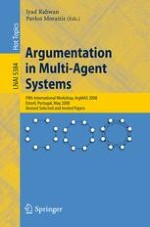During the last decade Argumentation has been gaining importance within Artificial Intelligence especially in multi agent systems. Argumentation is a powerful mechanism for modelling the internal reasoning of an agent. It also provides tools for analysing, designing and implementing sophisticated forms of interaction among rational agents, thus making important contributions to the theory and practice of multiagent dialogues. Application domains include: nonmonotonic reasoning, legal disputes, business negotiation, labor disputes, team formation, scientific inquiry, deliberative democracy, ontology reconciliation, risk analysis, scheduling, and logistics.
This volume presents the latest developments in this area at the interface of argumentation theory and multi agent systems. The 10 revised full papers presented together with 3 invited papers from the AAMAS 2008 conference were carefully reviewed and selected from numerous submissions. The papers are organized in topical sections on argument-based reasoning, argumentation and dialogue, as well as strategic and pragmatic issues.
